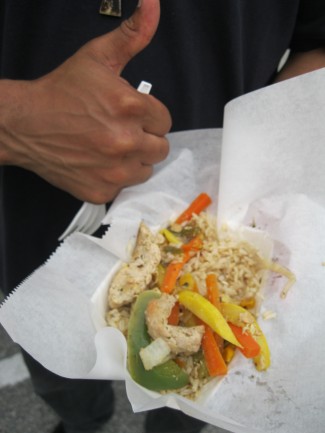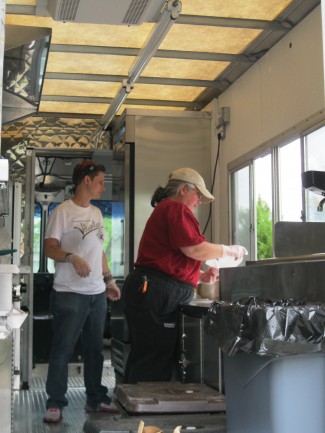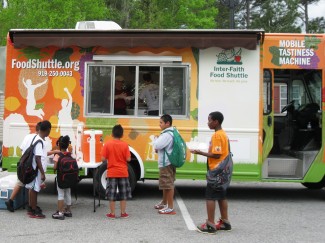The Food Drive Kids, Alexander and William Winslow, are working hard in the fight against hunger through their food drives, donations, and community gardens!
Bringing School Pantries to Hungry High-Schoolers in Raleigh
More Kids Fed, Thanks to You and the Mix 101.5 BackPack Buddies Food Drive
Many thanks to all who donated at this year's Mix 101.5 WRAL-FM's BackPack Buddies Food Drive - thanks to you, we can not only better support the BackPack Buddies program, but 125 more local kids in need will receive a backpack filled with nutritious weekend meals to take home every Friday.
We CAN end hunger if we all work together!
"If I didn't get a BackPack..."
If you have ever thought hunger is not a problem in our community, consider this comment from a Wake County 3rd grader, just this past week:
"My mom is working but when she gets her check she doesn't have enough money to buy enough food for all of us. I live with my Mom, Dad, and four brothers and sisters...There have been times when there wasn't any food or enough food. Then, we ask a lady for some food, and she gives us some. Some nights we don't have food - I eat breakfast and lunch at school, and that's it. Most nights we don't eat dinner, or only some people eat because there's not enough for everybody."
There are TENS of THOUSANDS of children just like this young girl in our schools.
Through BackPack Buddies, we're able to provide the children most in need with nutritious meals over the weekend so they can come to school nourished and ready to learn. But so many more still need food - and YOU can help us feed them!
Donate Food or Funds this Wednesday, August 21st at the Mix 101.5 BackPack Buddies Food Drive!
During the 2012-2013 school year, we....
- Fed 1687 children each week throughout the year at 55 sites
- Distributed 59,175 BackPacks
- Filled with 355,050 meals / 710,100 pounds of food
But over 119,000 children in the greater Triangle area applied for free and reduced price lunch last year – we NEED to reach more of them – and YOU can help us by donating food or funds!
You can feed a child for $35 a month!
- $350 per academic year provides a child a BackPack filled with nutritious food each weekend for a 10-month school year.
- $420 per year provides a child with food each week year-round.
Need more convincing?
Here’s another comment we received just this past week from a Wake County 5th grade student:
“I’ve been getting a backpack since half of last year and this year…When I get home with my backpack, I unload it, put the food away, eat a granola bar, drink two juice boxes, and eat the apple…I feel good about getting a BackPack. Since my Mother was fired, we don’t have a lot of money, so that’s pretty much what I eat all weekend. During the rest of the week, I cook up some noodles that I’ve saved from the bag. If I didn’t get a backpack, I would go without eating or eat a can of vegetables. I have gone a day without eating before.”
Donate now to help! Because hunger is unacceptable, and no child should have to go without eating.

Mobile Tastiness Machine spotted in Parrish Manor
Last week, the Mobile Tastiness Machine made its way on the road for a pilot run in the community of Parrish Manor, where we also work with neighborhood youth to manage a community garden and host nutrition education classes. The food truck, which houses our Mobile Meals program, made its debut with tasty turkey stir-fry with vegetables and brown rice, and a side of fresh strawberries. "Yay!" came the first customer's response upon hearing the menu.


Chef Terri Hutter and Kitchen Manager Sunshine Beard worked the window.
Kids in the community gave curious looks and shouts over to the colorful truck as the school bus dropped them off in front of the Parrish Manor office where we were parked. Some were hesitant to wander over at first, but once they heard that the food was free, they didn't just wander up to the truck....they ran.

Word spread pretty quickly, and soon dozens of kids were served hot, nutritious meals.
Look for the truck in low-income communities this summer serving up hot lunches and supper six days a week, along with nutrition education and physical activities.
School Pantries mean Food Access for Students
Students at area schools are now back for another semester of learning. For some students, returning to school after a winter break may mean a return to more accessible food, and not just through the free and reduced-price lunch program. Inter-Faith Food Shuttle’s School Pantry program began during the 2010-2011 academic year with a pilot pantry at Southern High School in Durham. During the 2011-2012 academic year, we expanded to 4 other middle and high schools in Durham: Hillside New Technical High School, Northern High School, Neal Middle School, and Githens Middle School. The pilot program began with a delivery of fresh fruit to the school every other week. Faculty and staff would take the fresh fruit that Inter-Faith Food Shuttle delivered and set it in baskets in high traffic areas for student to pick up, eat, and take home with them – they set the baskets up in the media center, in the front office, or even passed the fruit out at the busses. Students eyes widen with excitement just seeing Chelsea Travis, our School Pantry Program Coordinator, walk in the doors with a big box of fruit. The fruit is available to all students – meaning that lower income students are not singled out when taking what they need.
But all of the schools where we have started school pantries are high need, having over 50% of the student population enrolled in the free-and-reduced lunch program. Many of the schools have between 70-90% enrolled, and often not all eligible students end up actually signing up for the program. The national school lunch program can provide meals for students during the school day, but many go hungry on the evenings and weekends.
With the expanded pantry program, students can not only supplement their daily diet with fresh, nutritious fruit from IFFS, but they can also take home shelf-stable foods and dry goods as well to create full meals at home. Each school operates their pantry a little bit differently, each according to their own students’ needs, the culture of the school, and how the school decided best fits their needs. Each school found an area to house the pantry – be a storage room, a closet, or an old film area in the media center – and put up regulation shelves to store the food. Many of the students served are identified after coming to the school staff asking for assistance, saying that they hadn’t eaten that weekend, that there wasn’t much food around at home right now, they were hungry, was there anything for them to eat there? Other students are identified by school staff, who recommend or approach students that they know have a particular situation that may include them needing food.
Some school counselors would send bags full of food home with students each week for them and their families, while others would actually drive to the students’ houses and deliver the food. Some counselors would have the parents call to sign their children up for the program. Some would even work with students, asking what they and their family like to eat, ensuring that the food would get eaten and not just sit on a shelf in the student’s home instead of on a shelf at the school. The support for these pantries from faculty, staff, and parents is critical to ensuring that they run effectively and to reaching more students in need.
Our BackPack Buddies program provides nutritious weekend meals for elementary school children, but middle and high school students face the same problems of hunger. As students grow older, the stigma of asking for help and of being perceived as “in need” grows as well. Some of the middle school students race down the hall, asking “is that my bag of food?” but stigma of receiving assistance is an issue that often prevents students from receiving the assistance they need, especially in high schools. That’s why IFFS is working with these schools to dismantle stigma and to create a culture where everyone can receive help if they need it.
Southern High School actually has a student health center run through Youth Empowerment Solutions (YES). In the future, we hope the center will be able to give students “prescriptions” for food from the pantry. Many food insecure children and teens are malnourished, lacking in nutrients essential to healthy growth and development. But with a prescription in hand, students may be less reluctant to go to the pantry for assistance if they feel they need the food to improve their health and have “doctors orders” saying so.
Schools are a natural access point for young people to find more food – why not make it available at a place they are already going five days a week? At Neal Middle School this year, we also held two Mobile Markets at parents nights and cultural event nights at the school. Mobile Markets are free distribution sites we can set up anywhere with lots of fresh produce available there in addition to the regular fresh fruit and dry goods offered through the pantry. The food rolls in on our refrigerated trucks, and we set up a market where folks can shop for free. These events not only provided fresh produce and groceries to families in need at a time and place where they could easily access it, but also raised awareness of the pantry program as well.
On average, each pantry served 60-100 students each month, and 100-200 people per month counting others in the students’ households who also benefited from the extra food. While the program is now in the evaluation stage, many of the pantries are already on board to participate next year as well. We hope to continue to expand those numbers in 2013 and continue working towards creating a hunger-free community, because hunger is unacceptable.
To learn more about our Children's Hunger Relief Programs, visit our website.







